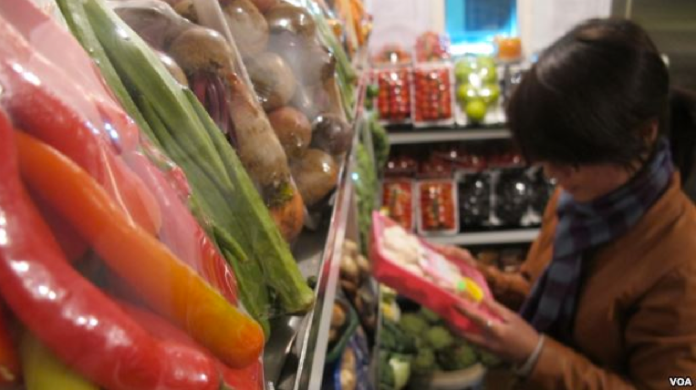

A shopper reads packaging on vegetables on sale at Veggies, a grocery shop in central Hanoi listed on a website providing consumers with information on where to buy “safe” vegetables, March 28, 2014. (Marianne Brown/VOA)
HANOI — In Vietnam, there are rising concerns about the excessive use of pesticides on crops. To ensure their vegetables are safe, some consumers are now shopping for produce online.
Billboards carry the message “don’t abuse pesticides, think of the consumer,” but a lack of government regulation has done little to combat the overuse of pesticides, and consumers are taking note. As a result, many are turning to the Internet to be better informed.
Out shopping in Hanoi’s city center, 30-year-old mother Tran Thuy Nhat expressed concerns many people can identify with.
She said she only buys vegetables from people she knows in her village on the outskirts of the city. She is worried about chemicals in vegetables and fruit and said if she buys these from someone she does not know, they could be harmful to her baby.
Not everyone is lucky enough to have access to farmers they know well. But a website dedicated to providing information about shops which sell “safe vegetables” in Hanoi aims to address this lack of trust.
The site, which means “safe vegetables, consumers” was set up by Vietnam’s consumer association Vinastas in 2011.
Dang Kiem Hien is part of the team in charge of it. She said the website gives addresses and phone numbers of shops selling safe or organic vegetables. Shops have to provide detailed information such as invoices, addresses and telephone numbers to prove that they get the vegetables from sources which are deemed safe or organic. If a shop is discovered to not be complying, it will be expelled, Hien said.
Farmers in Vietnam use a lot of pesticides. In its effort to push productivity and food security goals, the government promotes use of chemical inputs, such as fertilizers and pesticides, and subsidizes them.
Eduardo Sabio, a Hanoi-based regional representative of Belgian non-governmental organization VECO, which supported the “rau sach” website, says there is a real problem with pesticide misuse.
“Some are improperly labeled because they come from suspect origins. The government has a list of pesticides that are allowed, but almost always there are “illegal” pesticides that get over the border and get to the farmers,” Sabio said.
Because of Vietnam’s agrarian system, which allows farmers to have access to very small parcels of land, it is very difficult for growers to produce organic vegetables, he said.
“For instance, in a half hectare area there could easily be four or five or even more farmers planting different crops at different times of the year using different pesticides and chemicals. So even if you claim to be organic in a 1,000 square meter of farm but your neighbor is using pesticide without any barrier between the two farms you cannot claim you are organic” explained Sabio. “Because of the drift from applications from pesticides can easily spread over to your farm.”
Organic certification
He said Vietnam does have an organic certification process, but it is not suited to smallholders because of the large number of criteria, forms to fill in and the high cost.
That’s why “rau sach” uses the Participatory Guidance System (PGS), which is applied in more than 20 other countries around the world.
The system tries to enforce quality standards via regular peer review that involves a wide range of stakeholders including farmers associations, traders, and local officials. Farmers keep detailed logbooks of each pesticide spray, which is regularly monitored. Nearby farmers also keep an eye on what applications are being made by their neighbors.
Ha My, who runs the Hanoi branch of vuonrau – an online vegetable delivery service – said her business is certified with Viet Gap.
After setting up just last year, they already have around 1,000 customers across the country.
Ha said consumers are worried about the origin of their vegetables so more people are turning to online resources like Facebook.
“Facebook is also the real life of people, from friend by friend, they know other mutual friends, oh my friend buy from this shop, she showed the delicious vegetables, oh I trust her, I trust my friend so now I trust your shop. It’s also the name and the face of people too, who use Facebook, the more friends you have, who you are, it shows on your Facebook too,” said Ha.
Trust is key. For that reason, experts say Vietnam needs a regulatory body to ensure producers comply with the requirements for organic or safe farming. This is not just for the benefit of farmers and consumer, but also to avoid cases of poisoning linked to government-subsidized pesticides.
